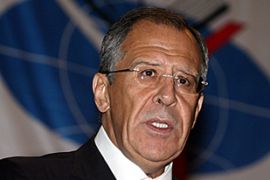EU cautious on move against Russia
Moscow says “standard” has been set on how Russia would defend its interests.

But others including Britain and some former Soviet states say Moscow must face some consequences.
Option of ‘dialogue’
Francois Fillon, the French prime minister, said Nicolas Sarkozy, the president, would embark on a new mediation effort between Georgia and Russia, and stressed the need for dialogue with Moscow.
“Either we want to re-launch the Cold War, point our finger at Russia, isolate it and stamp on it as was the case for a decade – that is not the choice of France or Europe – or we choose the option of dialogue,” Fillon told French radio.
“Today the word ‘sanctions’ is not on the agenda, today the word is ‘dialogue’,” he added, conceding that EU states would go into the meeting with “very different positions”.
Silvio Berlusconi, the Italian prime minister, said Russia was a power to be reckoned with and that he did not expect any steps from the Brussels meeting that would “aggravate” the situation.
“It still has a nuclear potential able to destroy ten times the population of the world. It’s a country growing at a rate of 7-8 per cent a year. It’s a country which has oil and gas,” he said.
EU presidency sources expect the summit to warn Moscow that EU-Russia ties will be put “under observation” before a long-scheduled EU-Russia summit in Nice, France, on November 14.
The EU is also due to offer closer ties with Georgia, including talks on a free trade deal, an easier visa regime for its citizens and the deployment of a civilian EU monitors.
The dispute within the EU is complicated by the bloc’s dependence on Moscow for much of its oil and gas, and the struggle to develop other sources such as the Nabucco pipeline due to bring Azeri gas to Europe via Georgia and Turkey.
It is also made difficult by the West’s desire to retain Russia’s cooperation on difficult diplomatic issues like Iran’s nuclear programme.
Western demands
Russia sent its troops into Georgian territory after Georgia’s military tried to retake South Ossetia, another Moscow-backed region which rejects Tbilisi’s rule.
Moscow has withdrawn most of its forces in line with a ceasefire deal but has kept soldiers and equipment in “security zones”, which include undisputed Georgian territory around South Ossetia and Abkhazia.
Western governments have demanded Moscow pull its troops back to pre-conflict positions, as it agreed to do under a French-brokered peace plan.
The Kremlin says the troops are peacekeepers needed to protect the separatist regions from new Georgian aggression.
In a speech on Monday, Lavrov said to diplomatic students that Russia’s response to Georgia’s bid to take back South Ossetia had “set a kind of standard for reaction, which fully complies with international law”.
He warned the West against supporting Georgia’s leadership and called for an arms embargo against the nation until a different government is in place in the former Soviet republic.
Lavrov’s remarks are likely to anger the United States and Europe and enrage Mikhail Saakashvili, the Georgian president.
He made it clear Moscow wants Saakashvili out of power in Georgia.
“If the United States and its allies in the end choose not their own national interests, not the interests of the Georgian people, but rather choose the Saakashvili regime, it will be a mistake of historic proportions,” Lavrov said.
“It would be right to impose an embargo on weapons to this regime, until different authorities turn Georgia a normal state,” he added.
Lavrov was making a traditional speech at the Moscow Institute for Foreign Relations, known as MGIMO University, which he graduated from in 1972.